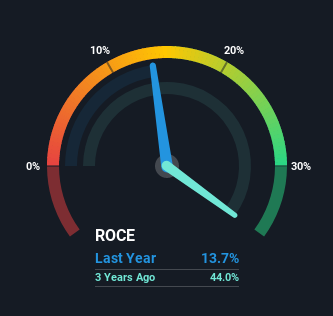
Finding a business that has the potential to grow substantially is not easy, but it is possible if we look at a few key financial metrics. Amongst other things, we'll want to see two things; firstly, a growing return on capital employed (ROCE) and secondly, an expansion in the company's amount of capital employed. Basically this means that a company has profitable initiatives that it can continue to reinvest in, which is a trait of a compounding machine. In light of that, when we looked at Allied Farmers (NZSE:ALF) and its ROCE trend, we weren't exactly thrilled.
Return On Capital Employed (ROCE): What is it?
Just to clarify if you're unsure, ROCE is a metric for evaluating how much pre-tax income (in percentage terms) a company earns on the capital invested in its business. To calculate this metric for Allied Farmers, this is the formula:
Return on Capital Employed = Earnings Before Interest and Tax (EBIT) ÷ (Total Assets - Current Liabilities)
0.14 = NZ$2.2m ÷ (NZ$31m - NZ$15m) (Based on the trailing twelve months to June 2021).
So, Allied Farmers has an ROCE of 14%. On its own, that's a standard return, however it's much better than the 8.4% generated by the Food industry.
See our latest analysis for Allied Farmers

Historical performance is a great place to start when researching a stock so above you can see the gauge for Allied Farmers' ROCE against it's prior returns. If you're interested in investigating Allied Farmers' past further, check out this free graph of past earnings, revenue and cash flow.
What The Trend Of ROCE Can Tell Us
On the surface, the trend of ROCE at Allied Farmers doesn't inspire confidence. Over the last five years, returns on capital have decreased to 14% from 58% five years ago. However it looks like Allied Farmers might be reinvesting for long term growth because while capital employed has increased, the company's sales haven't changed much in the last 12 months. It's worth keeping an eye on the company's earnings from here on to see if these investments do end up contributing to the bottom line.
On a related note, Allied Farmers has decreased its current liabilities to 48% of total assets. That could partly explain why the ROCE has dropped. Effectively this means their suppliers or short-term creditors are funding less of the business, which reduces some elements of risk. Since the business is basically funding more of its operations with it's own money, you could argue this has made the business less efficient at generating ROCE. Keep in mind 48% is still pretty high, so those risks are still somewhat prevalent.
The Bottom Line
To conclude, we've found that Allied Farmers is reinvesting in the business, but returns have been falling. Since the stock has gained an impressive 51% over the last five years, investors must think there's better things to come. Ultimately, if the underlying trends persist, we wouldn't hold our breath on it being a multi-bagger going forward.
Since virtually every company faces some risks, it's worth knowing what they are, and we've spotted 4 warning signs for Allied Farmers (of which 2 are significant!) that you should know about.
While Allied Farmers isn't earning the highest return, check out this free list of companies that are earning high returns on equity with solid balance sheets.
New: Manage All Your Stock Portfolios in One Place
We've created the ultimate portfolio companion for stock investors, and it's free.
• Connect an unlimited number of Portfolios and see your total in one currency
• Be alerted to new Warning Signs or Risks via email or mobile
• Track the Fair Value of your stocks
Have feedback on this article? Concerned about the content? Get in touch with us directly. Alternatively, email editorial-team (at) simplywallst.com.
This article by Simply Wall St is general in nature. We provide commentary based on historical data and analyst forecasts only using an unbiased methodology and our articles are not intended to be financial advice. It does not constitute a recommendation to buy or sell any stock, and does not take account of your objectives, or your financial situation. We aim to bring you long-term focused analysis driven by fundamental data. Note that our analysis may not factor in the latest price-sensitive company announcements or qualitative material. Simply Wall St has no position in any stocks mentioned.
About NZSE:ALF
Flawless balance sheet with solid track record.

